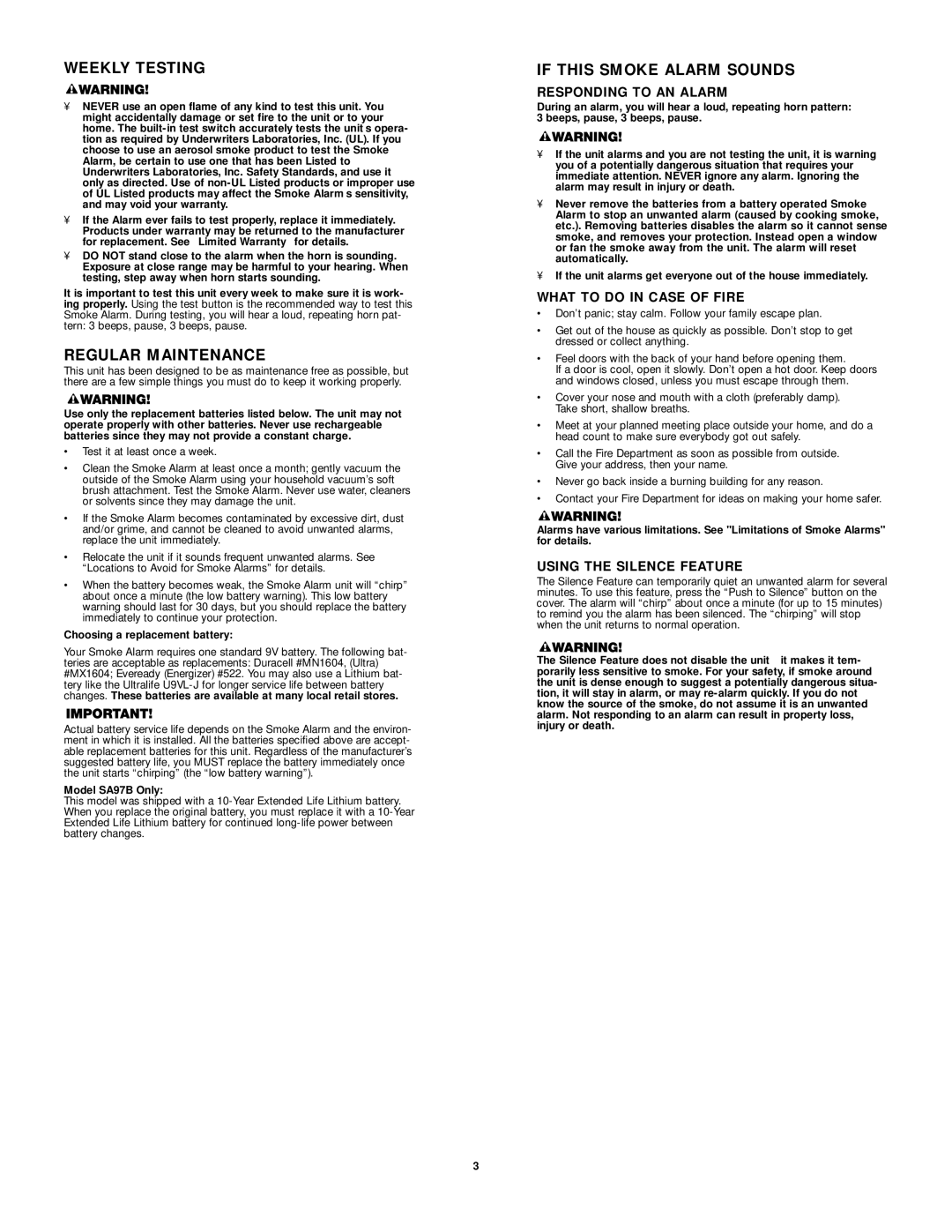WEEKLY TESTING
•NEVER use an open flame of any kind to test this unit. You might accidentally damage or set fire to the unit or to your home. The built-in test switch accurately tests the unit’s opera- tion as required by Underwriters Laboratories, Inc. (UL). If you choose to use an aerosol smoke product to test the Smoke Alarm, be certain to use one that has been Listed to Underwriters Laboratories, Inc. Safety Standards, and use it only as directed. Use of non-UL Listed products or improper use of UL Listed products may affect the Smoke Alarm’s sensitivity, and may void your warranty.
•If the Alarm ever fails to test properly, replace it immediately. Products under warranty may be returned to the manufacturer for replacement. See “Limited Warranty” for details.
•DO NOT stand close to the alarm when the horn is sounding. Exposure at close range may be harmful to your hearing. When testing, step away when horn starts sounding.
It is important to test this unit every week to make sure it is work- ing properly. Using the test button is the recommended way to test this Smoke Alarm. During testing, you will hear a loud, repeating horn pat- tern: 3 beeps, pause, 3 beeps, pause.
REGULAR MAINTENANCE
This unit has been designed to be as maintenance free as possible, but there are a few simple things you must do to keep it working properly.
Use only the replacement batteries listed below. The unit may not operate properly with other batteries. Never use rechargeable batteries since they may not provide a constant charge.
•Test it at least once a week.
•Clean the Smoke Alarm at least once a month; gently vacuum the outside of the Smoke Alarm using your household vacuum’s soft brush attachment. Test the Smoke Alarm. Never use water, cleaners or solvents since they may damage the unit.
•If the Smoke Alarm becomes contaminated by excessive dirt, dust and/or grime, and cannot be cleaned to avoid unwanted alarms, replace the unit immediately.
•Relocate the unit if it sounds frequent unwanted alarms. See “Locations to Avoid for Smoke Alarms” for details.
•When the battery becomes weak, the Smoke Alarm unit will “chirp” about once a minute (the low battery warning). This low battery warning should last for 30 days, but you should replace the battery immediately to continue your protection.
Choosing a replacement battery:
Your Smoke Alarm requires one standard 9V battery. The following bat- teries are acceptable as replacements: Duracell #MN1604, (Ultra) #MX1604; Eveready (Energizer) #522. You may also use a Lithium bat- tery like the Ultralife U9VL-J for longer service life between battery changes. These batteries are available at many local retail stores.
Actual battery service life depends on the Smoke Alarm and the environ- ment in which it is installed. All the batteries specified above are accept- able replacement batteries for this unit. Regardless of the manufacturer’s suggested battery life, you MUST replace the battery immediately once the unit starts “chirping” (the “low battery warning”).
Model SA97B Only:
This model was shipped with a 10-Year Extended Life Lithium battery. When you replace the original battery, you must replace it with a 10-Year Extended Life Lithium battery for continued long-life power between battery changes.
IF THIS SMOKE ALARM SOUNDS
RESPONDING TO AN ALARM
During an alarm, you will hear a loud, repeating horn pattern: 3 beeps, pause, 3 beeps, pause.
•If the unit alarms and you are not testing the unit, it is warning you of a potentially dangerous situation that requires your immediate attention. NEVER ignore any alarm. Ignoring the alarm may result in injury or death.
•Never remove the batteries from a battery operated Smoke Alarm to stop an unwanted alarm (caused by cooking smoke, etc.). Removing batteries disables the alarm so it cannot sense smoke, and removes your protection. Instead open a window or fan the smoke away from the unit. The alarm will reset automatically.
•If the unit alarms get everyone out of the house immediately.
WHAT TO DO IN CASE OF FIRE
•Don’t panic; stay calm. Follow your family escape plan.
•Get out of the house as quickly as possible. Don’t stop to get dressed or collect anything.
•Feel doors with the back of your hand before opening them.
If a door is cool, open it slowly. Don’t open a hot door. Keep doors and windows closed, unless you must escape through them.
•Cover your nose and mouth with a cloth (preferably damp). Take short, shallow breaths.
•Meet at your planned meeting place outside your home, and do a head count to make sure everybody got out safely.
•Call the Fire Department as soon as possible from outside. Give your address, then your name.
•Never go back inside a burning building for any reason.
•Contact your Fire Department for ideas on making your home safer.
Alarms have various limitations. See "Limitations of Smoke Alarms" for details.
USING THE SILENCE FEATURE
The Silence Feature can temporarily quiet an unwanted alarm for several minutes. To use this feature, press the “Push to Silence” button on the cover. The alarm will “chirp” about once a minute (for up to 15 minutes) to remind you the alarm has been silenced. The “chirping” will stop when the unit returns to normal operation.
The Silence Feature does not disable the unit—it makes it tem- porarily less sensitive to smoke. For your safety, if smoke around the unit is dense enough to suggest a potentially dangerous situa- tion, it will stay in alarm, or may re-alarm quickly. If you do not know the source of the smoke, do not assume it is an unwanted alarm. Not responding to an alarm can result in property loss, injury or death.

